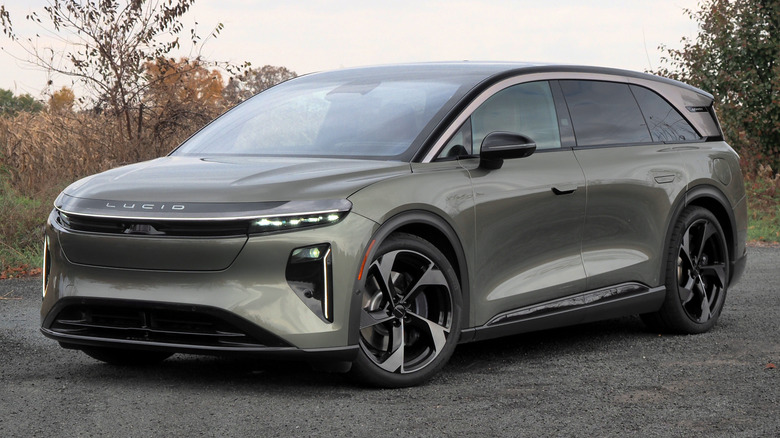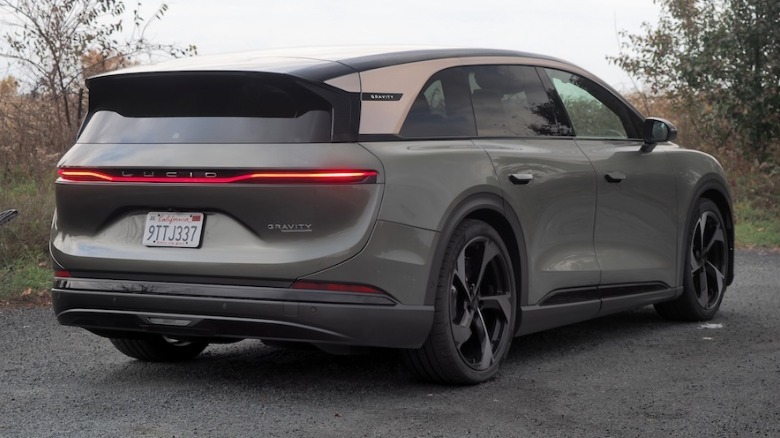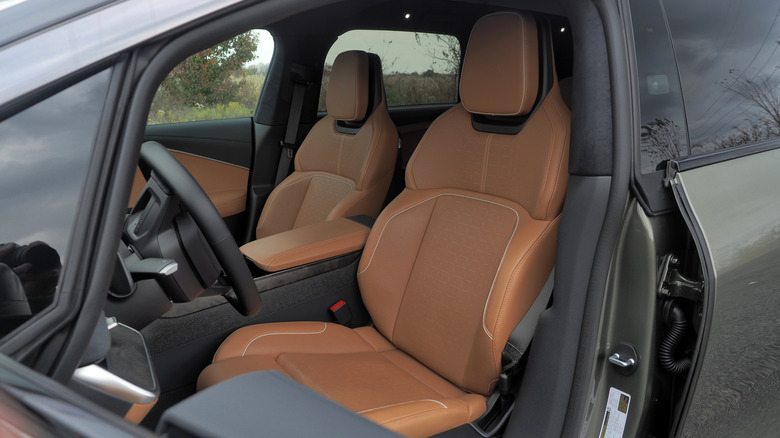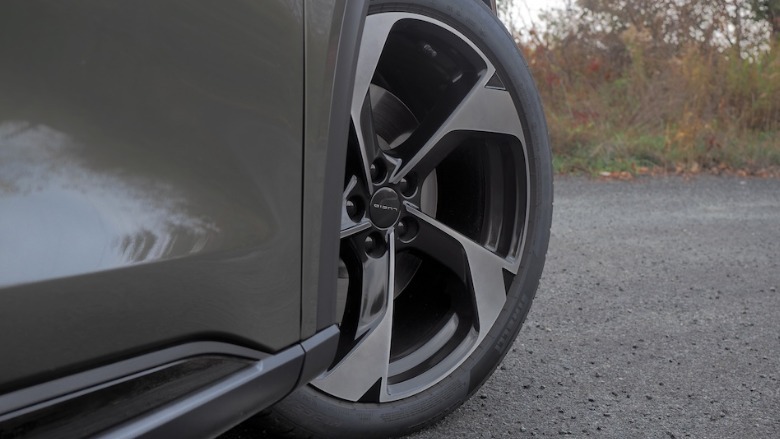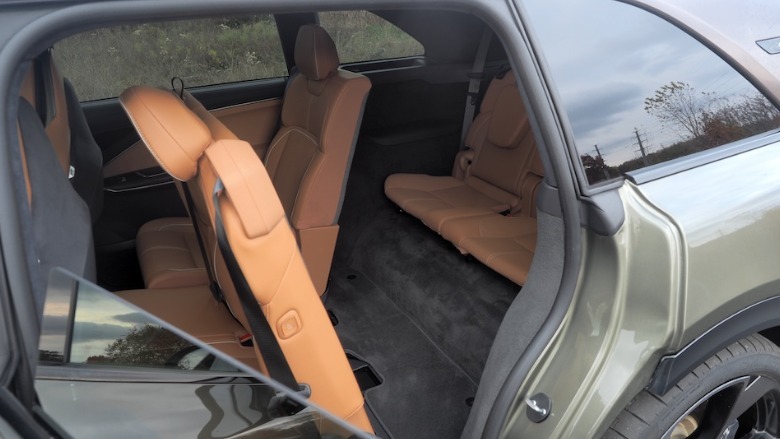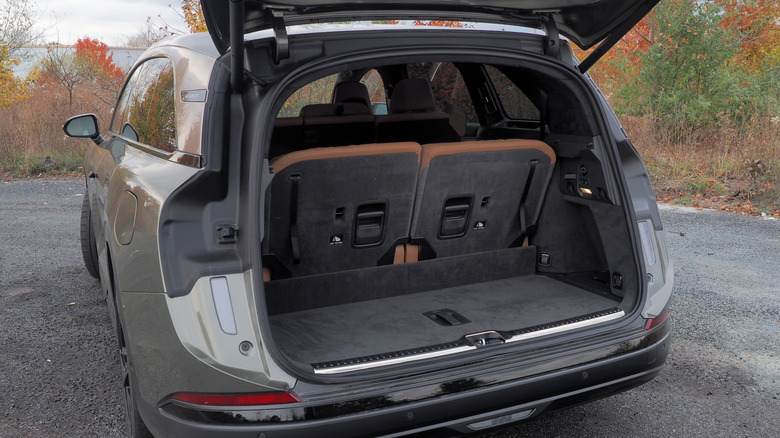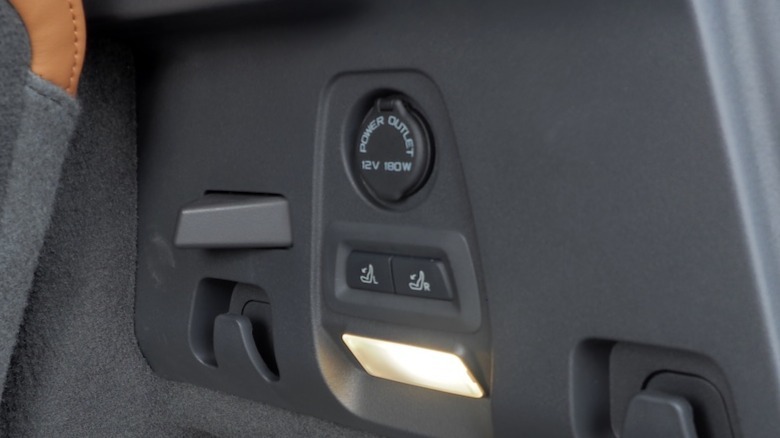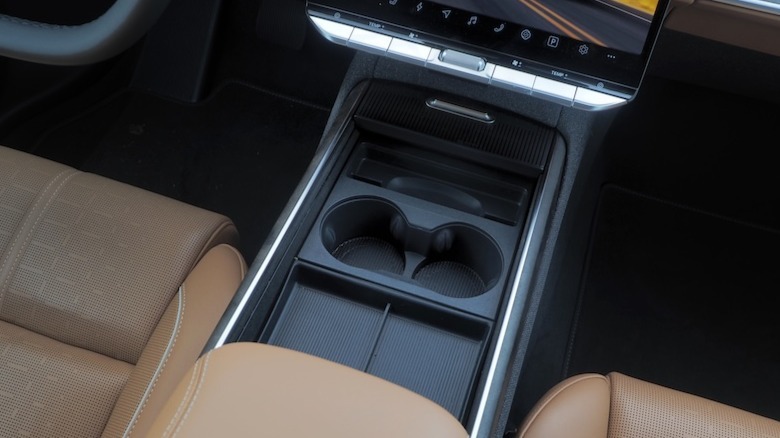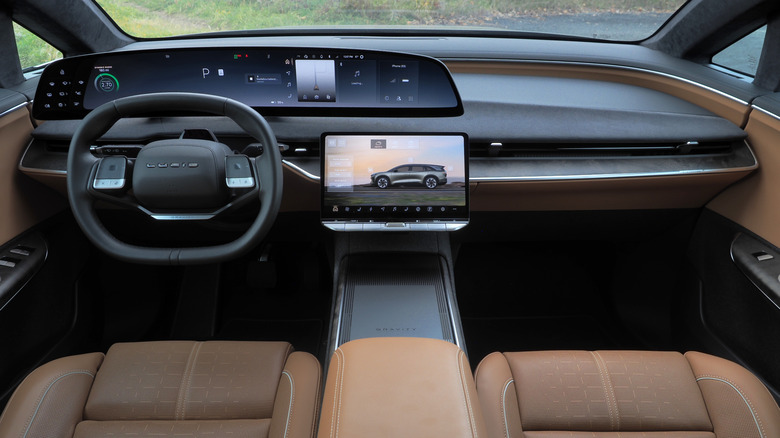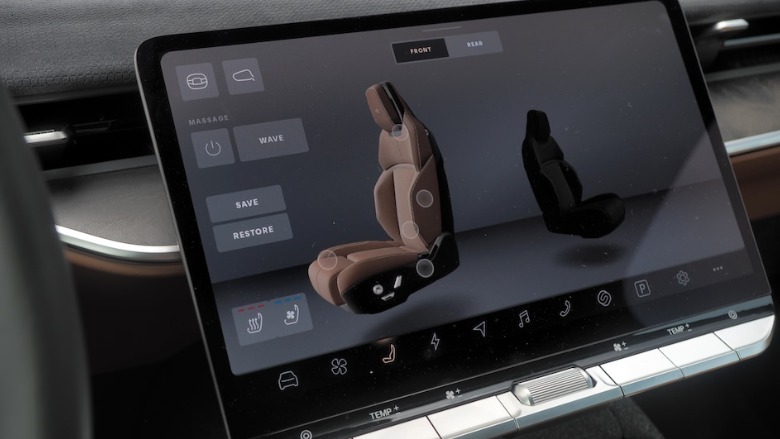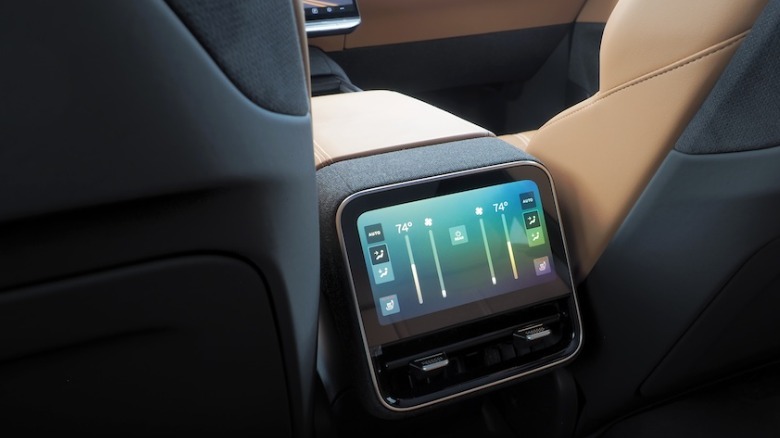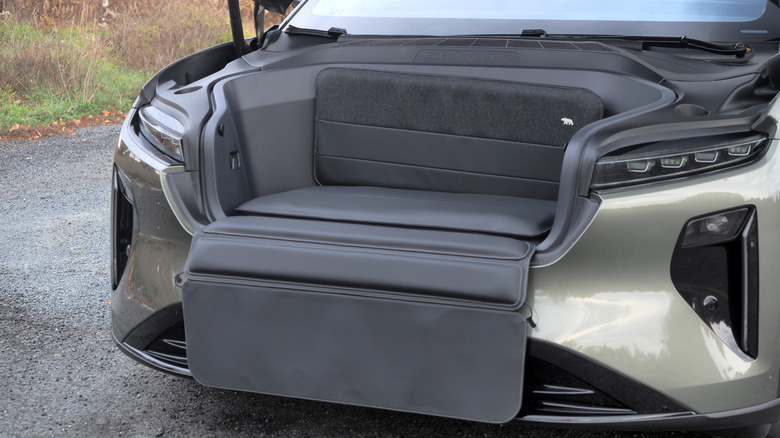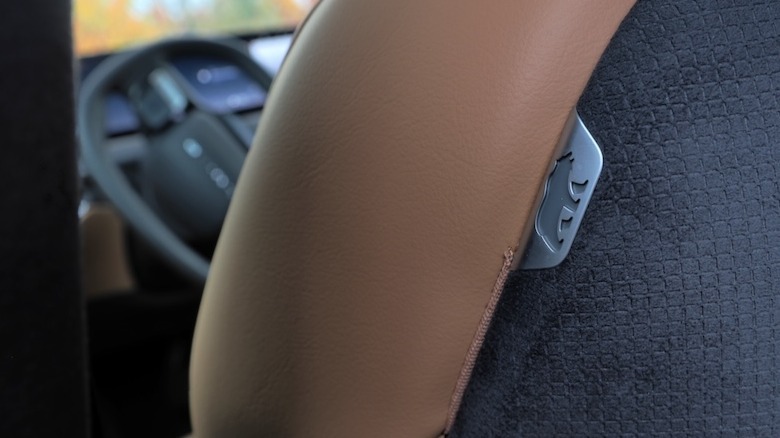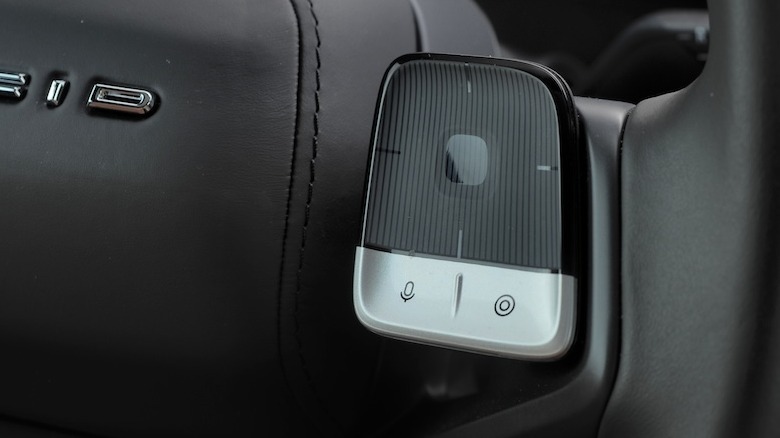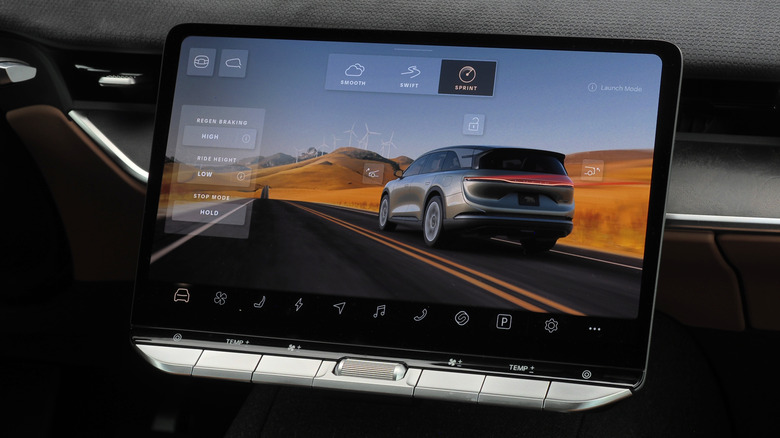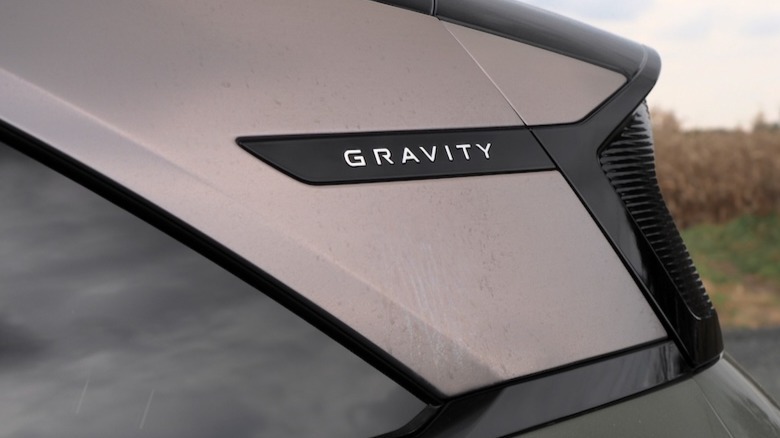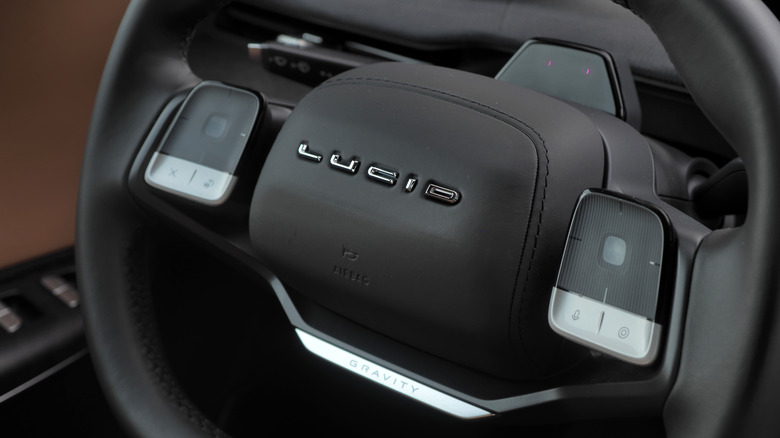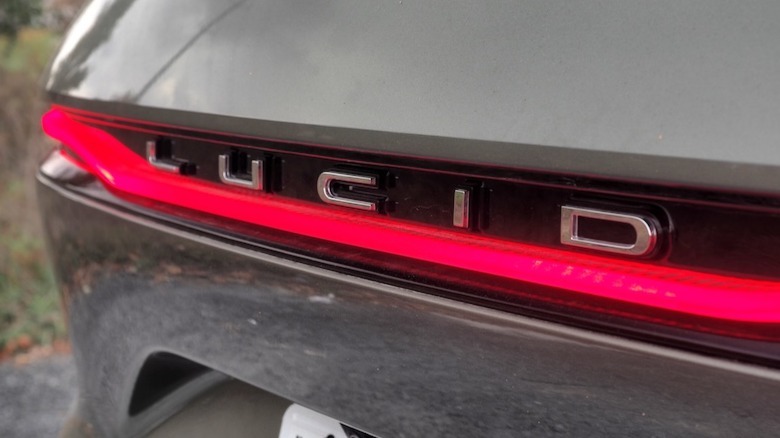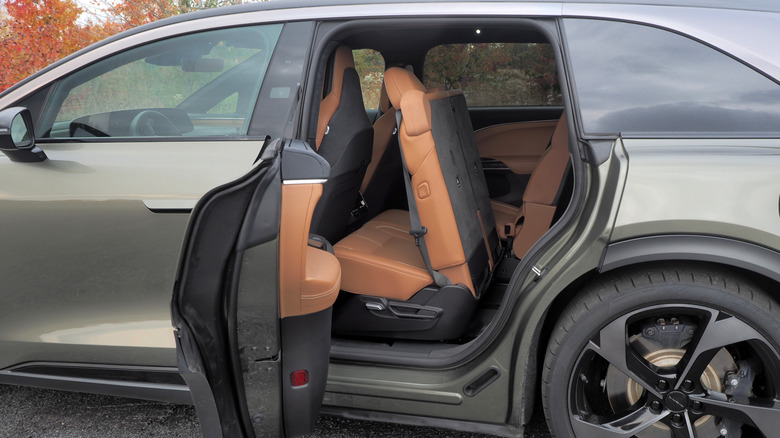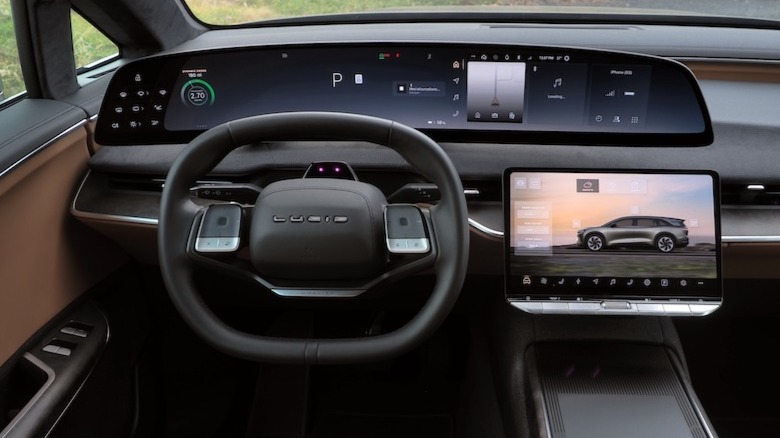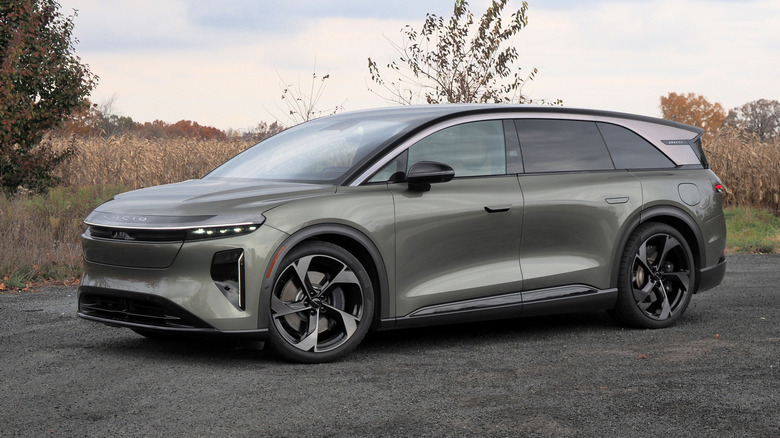Lucid's 2026 Gravity Is A Sports Car Pretending To Be A Family SUV
Second acts are tricky, not least when you're an automotive startup trying to carve out an expensive niche with a drivetrain U.S. regulators keep trying to torpedo. You could make a solid argument, then, that the new 2026 Gravity is the car Lucid ought to have led with. After all, lovely as the original Air may be, the market for SUVs well outweighs that of sedans, at least in North America.
Lucid may not be ecstatic for me to say it, but to my eyes — and when at its lowest suspension height setting — the Gravity looks a lot like a chunky wagon. Now, for me, that's an excellent thing: I've long bemoaned Volvo's reluctance to build an all-electric wagon. All the same, I concede that attitudes toward that body style haven't exactly been conducive to strong sales in the U.S.
Officially, the Gravity is an SUV (calling it a minivan would be nearly as offensive as the wagon reference, I suspect), and it generally looks fantastic. Elements of the Air sedan — like the hood-spanning light bar and vertical DRLs — carry over neatly and cohesively, and the two-tone finish is sleek and visually interesting. The vast rear spoiler is presumably intricately involved in the EV's aerodynamics and thus its lengthy range, though it does cut into rear visibility.
Spacious, though seven seats are optional
Black is the only free paint option; if you want white, grey, bronze, or this fetching Aurora Green Metallic (or don't mind waiting for a metallic silver coming later), you'll need to cough up $1K more. A brighter finish wouldn't go amiss (who knows, maybe a Sapphire Blue is on the cards). 20-inch front and 21-inch rear wheels are standard on the Grand Touring trim; larger 21/22-inch or 22/23-inch pairings are available.
The Air is remarkably spacious inside, but it's still a sedan with seating for five and fairly odd proportions to its trunk lid (loading it up with suitcases feels rather like you're posting them through a huge mailbox slot). In contrast, the Gravity seats up to seven — with a 2+3+2 layout — and has a far more practical trunk. You'll pay Lucid $2,900 for that third row, mind, since the five seat configuration is standard.
At least it's capaciously adult-scale in all three rows: the second row bench could've folded forward a little more for my tastes, to make entry and exit a tad more elegant. However, once I was in the rearmost seats, my 5-foot-8-inches had headroom and legroom to spare. Drop the third row — they leave a flat floor — and the 21.3 cubic-feet of cargo space expands to 56.2 cubic-feet.
More cargo space than a minivan
Fold the second row bench, and that surges to 111.9 cubic-feet — more, incidentally, than you get in a minivan like the Toyota Sienna. The Gravity's frunk holds another 8.1 cubic-feet; or, in the case of this particular car, has a plush fold-out cushion (that's removable) for whatever the glamping equivalent of front-tailgating is.
All trims get two USB-C ports in the first row (delivering up to 100W each) and two in the second row (up to 45W each); three-row configurations can have a further two for those rearmost passengers (also up to 45W each). However, while there's a 12V outlet in the cargo area, you have to pay at least $600 more to get a trio of 120V outlets: One in the frunk, one in the cabin, and one in the cargo area, with a maximum of 1.8 kW output.
Practically, some foibles remain. The pop-out door handles never failed to emerge for me — unlike my past experience with the Air — but there's a brief yet noticeable pause between tugging them and the door unlatching. At least Lucid has a proper key fob now, with actual buttons for locking, unlocking, and power-opening the front and rear trunks.
A big screen, but not an overwhelming one
For what's undoubtedly a high-tech car, the Gravity's dashboard very nearly manages to feel low-key with its gadgetry. A wide-aspect display seems to float ahead of the driver, sizable but rescued from overload by virtue of Lucid's pared-back interface. Another touchscreen in the center console handles everything from drive modes, to adjusting mirrors and the steering wheel (which would still be better done by traditional controls), to multimedia and parking-assistance.
There's a lot going on, but you can at least customize the shortcuts at the bottom of the screen, and the UI is swiftly responsive. Physical switchgear for the core HVAC adjustment and volume are welcome, as are manual air vent controls. Eventually, Lucid says, there'll be wireless Apple CarPlay and Android Auto support, but that wasn't enabled on this particular car.
There's a reasonably-sized storage bin between the front seats, and cubbies in the rear rows, plus the $2,500 Comfort & Convenience package adds a second row touchscreen to adjust the 4-zone climate control. It also adds power rear and side sunshades, plus heated second row outboard seats, soft-close doors, and some other niceties like heated windshield wipers.
Options galore
That wasn't the only luxury upgrade buoying the Gravity Grand Touring's price. The $4,200 Tahoe Nappa Leather with Luxury Seating Package spreads nicer hide across all three rows, and wraps the steering wheel in leather. It adds the massage and ventilation to the front seats (plus 18-way power adjustment), and subs in nicer trim like microsuede, walnut, and etched glass.
The $2,900 Surreal Sound Pro upgrade brings in a 22-speaker Dolby Atmos audio system. Then there's the $6,750 you spend for Lucid DreamDrive 2 Pro, a package of sensors and other hardware that the automaker says will (eventually) take the electric SUV closer to true autonomous driving. The base Gravity gets adaptive cruise control with hands-on lane centering, lane departure protection, automatic emergency braking, front and rear cross traffic protection, blind spot warnings & intervention, and other familiar ADAS features.
The $1,500 Premium upgrade adds blind spot display (beaming a video feed from the relevant side camera to the driver's display when you hit the turn signal), plus the 3D camera and auto-park. It also introduces Enhanced Hands-on Drive Assist, with lane-change assistance, speed-based suggested lane changes, and other upgrades. You'll need the full Pro package, however, to get hands-off Drive Assist, in addition to the ability for Gravity to remotely auto-park, along with handling other, trickier spots.
Not just fast for an SUV, fast period
It's hard to argue with the Gravity Grand Touring's performance numbers. Two electric motors deliver all-wheel drive and a fairly ridiculous 828 horsepower. 0-60 mph arrives in a mere 3.4 seconds — two tenths of a second behind a Porsche 911 GT3 — while the 123 kWh battery (usable) is EPA rated for up to 450 miles, wheels and seat-count depending.
To call this SUV fast, then, is to damn it with faint praise. There are three drive modes — Smooth, Swift, and Sprint — and, even with the aggressiveness dialed back, all are markedly speedy. Does a three-row family car need a Launch Mode? Probably not, but the Gravity gets one anyway. Even without that activated, hitting the accelerator sends it hurtling forward with passenger-startling eagerness, like a road-scale Shinkansen.
Where the Air gets — frankly magical — steel springs with adaptive dampers, single-chamber air suspension is standard on the Gravity (and a three-chamber system is available). It unlocks the SUV's adjustable ride height, with five levels for dipping during sportier driving or for easier ingress and egress, or rising up on metaphorical tippy-toes should you dare tackle vaguely off-road-like conditions.
More than just straight-line speed
Given the weight and the dimensions, my expectations for the Gravity on twistier routes were dimmed somewhat. The Air is astonishingly poised and balanced, level and composed despite lacking the air spring tech so many rival luxury sedans default to. In fact, I'd argue it feels more planted and predictable because of that absence. Bigger in all dimensions, the Gravity clearly presents a more fundamental challenge.
Despite all that, the results are impressive. Response to the squircle-shaped steering wheel is precise and perfectly-weighted; even its odd proportions proved unexpectedly comfortable. It avoids most of the shimmy that big cars on air suspension can succumb to when you change direction on less-than-ideal asphalt. Hit a corner at speed, and it'll be passenger stomachs that call it quits well before the Gravity's sharp handling gives up.
The smooth transition of regenerative and physical braking works just as well there as it does in more sedate, everyday puttering. Lucid has nailed one-pedal driving, modulating speed with the accelerator alone quickly becoming instinctive. This particular Gravity lacked the $2,900 Dynamic Handling Package, which — along with the air suspension upgrade — includes rear wheel steering; that trims four feet from the standard 42-foot turning diameter and helps it feel even more sports-car-like. Nice, but Lucid's high-resolution exterior cameras and ability to flag the proximity of obstacles in inches meant lower-speed maneuvers weren't a headache.
Defying direct comparisons
In seven-seat form, you pay a slight penalty for range: 437 claimed miles on the smallest wheel set, versus the headline 450 mile figure. I suspect I would've needed to baby the Gravity considerably more to get close to the on-paper numbers (forgive me: Sprint mode is simply too much fun). The claimed 2.7 mi/kWh I saw on the trip computer would suggest 332 miles from a full charge.
Given the relative dearth of electric SUVs with capacity for that many people (and adult-sized people, at that), your options are limited. Kia's excellent EV9 will do just 283 miles, admittedly with a starting price of $65,495 including destination for the cheapest AWD trim. Cadillac's Vistiq is arguably a closer match to the Lucid, though you'll need the Premium Luxury trim (from $93,590 including destination) to match the Gravity's air suspension.
Even then, the plush Caddy's 305 mile maximum range falls well short of the Lucid (on paper, anyway). You'll need an Escalade IQ to best the Gravity Grand Touring, at up to 465 miles, though then you're spending at least $129,795. Nobody is going to accuse the electric Escalade as being as fun to drive as Lucid's EV, either.
2026 Lucid Gravity verdict
From a market perspective, I still think Lucid would've made a bigger splash had it launched the Gravity first. I suspect, though, that the SUV is better by virtue of being Lucid's second act. No new brand rollout goes perfectly, and the Air was no different: The efforts involved in refining it undoubtedly left its SUV sibling more competitive on day one.
As was the case early in the Air's release, with its near-$117K sticker price once suitably equipped, this particular Gravity Grand Touring is far too much money for most families to consider. The new Touring trim will slice off $15K — it'll do up to 337 miles, Lucid says, and charge slightly slower — and even with its "mere" 560 horsepower, I'd wager it's more than potent enough for most. The mass market still has to wait to feel Lucid's impact, but among the luxury segment, it's setting benchmarks rivals struggle to match.
